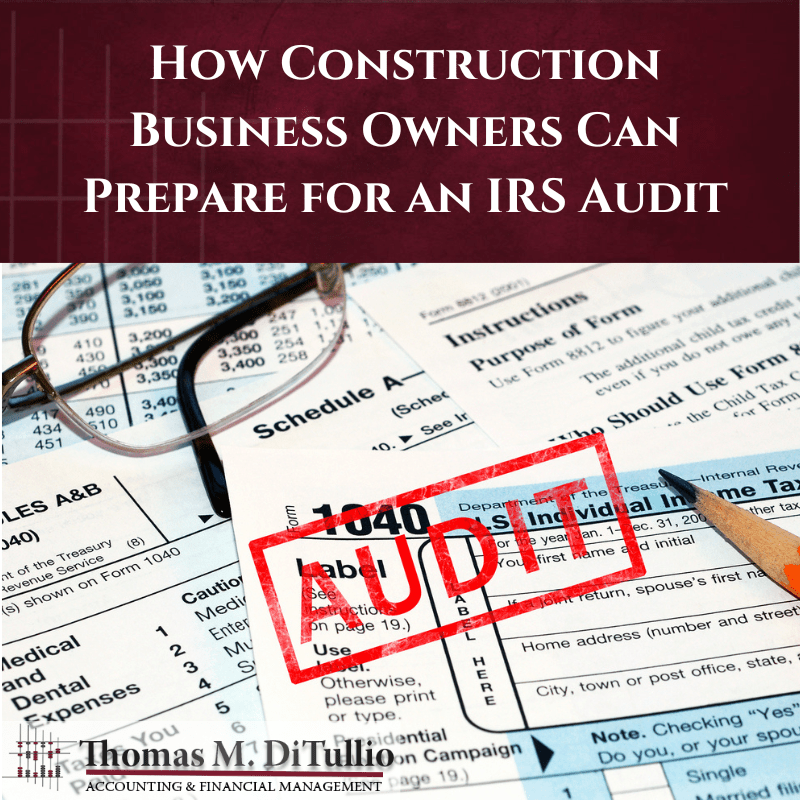How Construction Business Owners Can Prepare for an IRS Audit
The construction industry has always faced extra scrutiny by the Internal Revenue Service. The industry is known for misclassifying employees, under-reported income and cash transactions. Considering that the IRS has new technology and has added staffing, the risk of audit could increase over the next few years. TMD Accounting understands that receiving a notice that you are being audited by the IRS can be stressful. As a South Jersey accountant, we know that errors can lead to penalties are fines which is why we offer these tips for preparing for the audit.
What May Trigger an Audit
Although anything may trigger an audit of your income tax returns, there are some items that are commonly viewed as red flags, according to small business accounting services. If your return includes large deductions or losses that seem substantial, it may be flagged by the IRS. Large cash deposits or payments are another factor that might encourage the IRS to take a closer look, according to a South Jersey accountant.
If your tax returns differ from those provided by clients or vendors, there may be questions or if your tax return is linked to another tax-payer account that is facing or has faced an audit. One of the biggest mistakes made in the construction industry, however, is misclassifying employees as independent contractors when they are actually employees.
Employee Misclassification
The IRS allows you to hire contractors in any business, but there are very strict rules about when someone is classified as an employee and when they are classified as a contractor. An independent contractor cannot perform services that are controlled by the employer. For example, if you tell someone what hours they must work or how a job must be done, it is likely they are an employee not a contractor. If you control the details of how services are performed, that person is an employee. Some questions to ask when determining how to classify an employee include:
- Do you control how an employee does his or her specific job?
- Do you control how a worker is paid?
- Are expenses reimbursed by you or someone else?
- Who provides the tools to do the job?
- Is there a written contract between you and the employee?
- Does the employee receive vacation, sick time, health insurance or other benefits from you?
Probably the biggest question to ask, according to most South Jersey accountants, is whether the work is performed as a key aspect of the business. For instance, a painter who provides services is performing a key aspect of a construction business, but if that person has a contract and you use multiple painters for your projects, they are likely not an employee. However, a painter who has no contract and who does all the painting for your construction business may be viewed as an employee by the IRS, TMD Accounting explains.
Be Proactive
Of course, one of the best ways to avoid an audit is to be sure to have processes in place that guarantee your records are accurate. If you have questioned “do I need an accountant for my small business” after attempting to do your own taxes, the answer is likely yes as a South Jersey accountant can help you create processes that may help you avoid problems with the IRS in the future. Even if you decide to hire an accountant, you will still need to organize your records.
Invoices, receipts, contracts, bank statements should all be easily accessible and identifiable. You may also need time cards, documentation of change orders and information about withdrawals of materials from inventory if you have any. Having your records organized can ease the pressure of the audit as all the information you need will be in one location.
I Got an IRS Letter! What Do I Do?
If you already realized “I think I should hire an accountant for my small business” and that accountant filed your taxes, the first thing to do is to contact them with information about the letter. If you filed your own taxes, the first thing you do not want to do is panic. The letter you receive will have the information the IRS is checking, but it may not be completely clear. It is very important to remember that the IRS always contacts taxpayers by mail, never by phone, email or text. Often, the audit can be resolved by mail with no need to meet in person.
There will be details about who the auditor is on your case, so it is always a good idea to remain in contact with them about the process. You and your financial team should be available to answer any questions and provide documentation requested. Small business accounting services also recommend explaining any errors you may have discovered on your return that you were unaware existed until the audit letter arrived. This can go a long way toward resolving the matter quickly and easily.
Looking to Hire a South Jersey Accountant?
If you have been asking yourself “should I hire an accountant for my small business,” the answer is likely yes. It is highly recommended that construction companies hire a South Jersey accountant to hand all their small business accounting services, especially when it comes to filing tax returns.
Because the nature of the construction industry lends itself to IRS questions, using a South Jersey accountant like TMD Accounting is one of the best ways to help avoid an audit. If you are already facing an audit, our amazing team can help you determine what the IRS is looking for and possible save penalties and fees by addressing the questions the IRS is asking. Schedule an appointment today by calling 1-856-228-2205.

